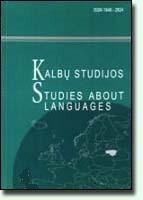Paprasta lietuvių kalba: pirmi žingsniai link automatinio administracinių tekstų paprastinimo
Plain Lithuanian: first steps towards automatic simplification of administrative texts
Author(s): Danguolė Kotryna Kapkan, Justina Mandravickaitė, Danguolė Kalinauskaitė, Eglė RimkienėSubject(s): Language studies, Law, Constitution, Jurisprudence, Theoretical Linguistics, Baltic Languages, Philology
Published by: Kauno Technologijos Universitetas
Keywords: plain language; administrative style texts; automatic text simplification; parallel text system;
Summary/Abstract: Plain language is a variety of standard language that aims to open up the content produced by experts to as wide an audience as possible, so that the target audience could easily find, understand and make use of the information (Adler, 2012; Cheek, 2010; Maaß, 2020). Plain language, which has been promoted in Western countries since the 1970s, is normally used by public institutions to provide information to the public. In Lithuania, plain language is a new concept, and in this article we present some suggestions on where to begin the development of plain Lithuanian, starting fromthe suggested principles of plain Lithuanian and on to automatic simplification of Lithuanian administrative texts. In the introductory section, we discuss the history and theoretical foundations of plain language, and justify the need for plain Lithuanian. After describing a methodology for developing plain language rules based on plain language principles from other languages and the Lithuanian guidelines for easy-to-read language (Bružaitė, Daraškienė & Vilkaitė, 2021) as well as easy-to-read language level descriptors (Bružaitė, Vilkaitė & Daraškienė, 2022), we propose and exemplify a set of basic rules for plain Lithuanian. These rules were applied in creating a parallel corpus of original administrative style texts and plain Lithuanian, which will be used for developing a solution for automatic simplification of administrative texts based on artificial intelligence. We conclude the paper with a quantitative analysis of the parallel corpus and perspectives for further research.
Journal: Kalbų Studijos
- Issue Year: 2024
- Issue No: 45
- Page Range: 5-26
- Page Count: 22
- Language: Lithuanian

